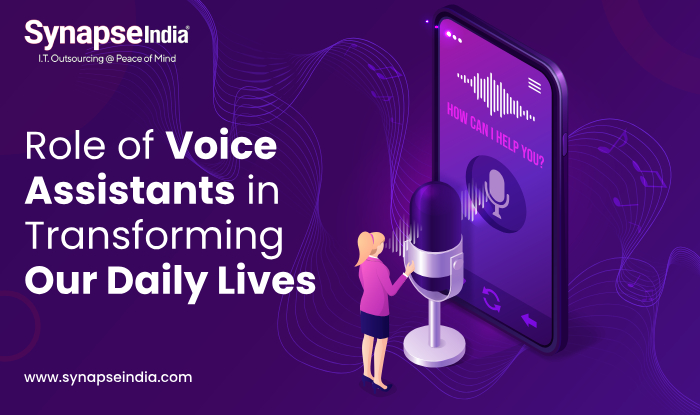 07 Feb 2024
07 Feb 2024
In recent years, voice assistants have revolutionized the way we interact with technology, making tasks easier and more efficient than ever before. This intelligent voice assistant app, powered by artificial intelligence, has seamlessly integrated into our daily lives, helping us with a myriad of tasks, from setting reminders to controlling smart home devices. In this blog, we will delve into the fascinating world of voice assistants and explore their role in shaping the future of technology and human-computer interaction. We will discuss the evolution of voice assistants, their capabilities, and their impact on various industries and everyday life. Join us on this journey as we uncover the transformative power of voice assistant app.
Voice search and voice assistants are technologies that enable users to interact with devices, applications, and services using spoken commands or queries instead of traditional text input.
Voice search allows users to perform searches on the internet by speaking aloud rather than typing keywords into a search engine. Users can ask questions, make requests, or search for information simply by speaking into a device equipped with voice recognition technology.
Voice assistants are intelligent virtual agents that can understand and respond to natural language commands and queries. These assistants, such as Amazon Alexa, Google Assistant, Apple Siri, and Microsoft Cortana, can perform a wide range of tasks, including setting reminders, playing music, providing weather updates, controlling smart home devices, and more.
Both voice search and AI voice assistants leverage natural language processing (NLP) and machine learning algorithms to understand and interpret spoken language, enabling seamless interaction between users and technology. These technologies have become increasingly popular due to their convenience, accessibility, and ability to streamline everyday tasks.

Voice assistants are useful for several reasons:
Voice assistants enable hands-free operation, allowing users to perform tasks and access information without the need to physically interact with devices. This convenience is particularly valuable in situations where manual interaction may be difficult or impractical, such as while driving or cooking.
Voice assistants make technology more accessible to a broader range of users, including those with disabilities or mobility impairments. By providing a natural and intuitive interface, voice assistants empower users to interact with devices and access digital services easier.
Voice assistants can perform tasks and retrieve information quickly and efficiently, often with just a simple voice command. This efficiency saves users time and effort compared to traditional methods of input, such as typing or navigating through menus.
Voice assistants can learn and adapt to individual user preferences over time, providing personalized recommendations, reminders, and assistance. This personalization enhances the user experience and allows for more tailored interactions with technology.
Voice assistants offer a wide range of functionalities, from basic tasks like setting alarms and sending messages to more advanced capabilities like controlling smart home devices, managing calendars, and providing entertainment options. This versatility makes AI voice assistants valuable for a variety of use cases and scenarios.
Overall, voice assistants enhance the usability and utility of technology by providing a convenient, accessible, and efficient means of interaction for users across diverse contexts and preferences.
Laravel Development Services benefits for enterprises extend beyond its surface features. The framework's design principles, community support, and commitment to a secure environment. It contributes an efficient, reliable, scalable, and well-suited for the dynamic requirements of modern enterprise applications.

Virtual assistants, such as Amazon Alexa, Google Assistant, Apple Siri, and Microsoft Cortana, have transformed daily lives in numerous ways:
Virtual assistants automate routine tasks, such as setting reminders, scheduling appointments, and creating shopping lists, freeing up users' time and mental energy for more important activities.
Virtual assistants provide instant access to a wealth of information, including weather forecasts, news updates, traffic conditions, and general knowledge queries, without the need to manually search for information online.
Virtual assistants integrate with smart home devices, allowing users to control lights, thermostats, security cameras, and other appliances using voice commands. This enhances convenience and enables users to manage their homes more efficiently.
Virtual assistants can play music, podcasts, audiobooks, and radio stations on command, providing entertainment options tailored to users' preferences and moods.
Virtual assistants help users stay organized and productive by managing calendars, sending reminders, and facilitating communication through voice calls, text messages, and emails.
Virtual assistants support users' health and wellness goals by providing fitness tracking, nutrition information, meditation guides, and sleep aids, promoting overall well-being.
Virtual assistants improve accessibility for users with disabilities or impairments by offering hands-free interaction and voice-based commands, enabling greater independence and inclusivity.
Virtual assistants offer educational content, language translation services, and interactive quizzes and games, fostering continuous learning and skill development.
Overall, virtual assistants have become indispensable companions in daily life, offering a wide range of functionalities that enhance convenience, productivity, entertainment, and well-being for users across diverse contexts and lifestyles.

